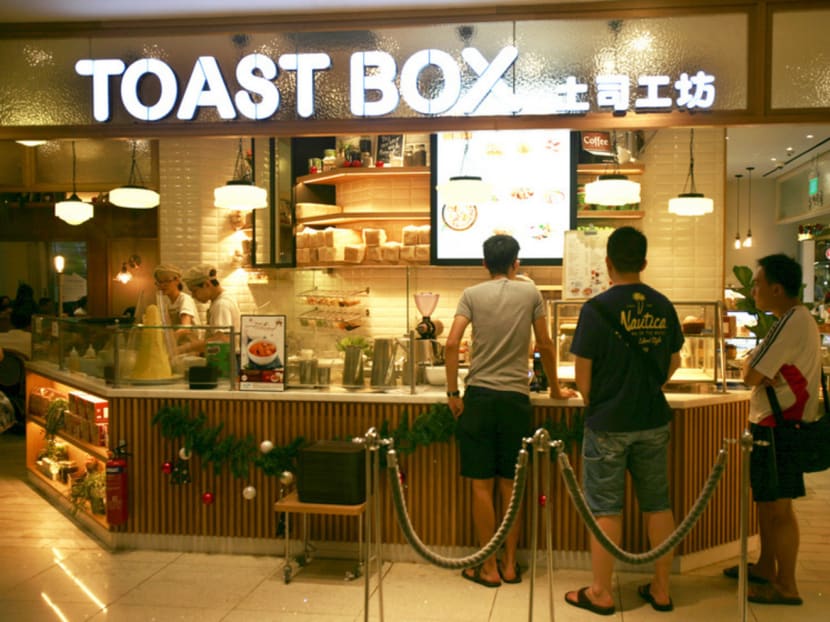More eating and drinking, a little less shopping, in malls
SINGAPORE — Philippines-based fast-food chain Jollibee opened two more outlets in recent weeks in Singapore at Square 2 Novena and Changi City Point as part of its expansion plans in the region. More and more food and beverage (F&B) brands, including the likes of homegrown Toast Box and Taiwan-based GongCha, are sprouting up in malls throughout the island.

More and more food and beverage brands, including Toast Box, are sprouting up in malls throughout the island. Photo: REUTERS
SINGAPORE — Philippines-based fast-food chain Jollibee opened two more outlets in recent weeks in Singapore at Square 2 Novena and Changi City Point as part of its expansion plans in the region. More and more food and beverage (F&B) brands, including the likes of homegrown Toast Box and Taiwan-based GongCha, are sprouting up in malls throughout the island.
This trend is borne out in a report on regional retail trends by real estate consultancy CBRE yesterday, which showed the proportion of F&B businesses in Singapore retail malls has risen to an average of between 25 and 30 per cent now from the 15 to 20 per cent about five to 10 years ago.
This reshaping in the retail landscape comes as rentals soften and landlords change the flavour of their malls in response to changing consumer needs, CBRE said.
Mr Desmond Sim, Head, CBRE Research, Singapore & South East Asia, said: “Landlords are now increasing F&B tenants in malls as they see the need to make malls a place for experience and lifestyle.”
Prime Orchard Road rents fell 0.6 per cent in the first quarter of the year from the previous quarter to S$42.85 psf per month, while prime suburban rents slipped by 0.8 per cent to S$29.65, CBRE noted. Overall island-wide prime rents are forecast to decline by another 2 per cent for the rest of this year, it added.
Mr Sim said: “The tough leasing climate has prompted some landlords to further adjust rental expectations, especially in areas where competition is stiff and foot traffic relatively poor. To save costs, more established retailers have opted to relocate out of prime corridors to secondary corridors, especially in the Orchard Road sub-market.”
“This is also encouraged by landlords as part of their tenant repositioning exercise. Freeing up prime space has allowed landlords to pursue retailers seeking flagship space. Brands, including F&B retailers, are still looking to introduce experiential or ‘retail-tainment’ concepts and are seeking larger floor plates,” he added.
The CBRE survey also showed that Singapore is ranked second in the Asia-Pacific region for the number of new entrants, with cafes and restaurants making up 23 of the 63 new entrants. New entrants are defined by CBRE as cross-border retailers that opened their first standalone store for business during the year.
The retail headwinds in Singapore will create opportunities for international retailers to enter the market as rents decline, CBRE noted.
“Singapore is a gateway for many retailers into South-east Asia. It also acts as a testbed for them into the South-east Asian market. Singapore is cosmopolitan and more exposed to brands setting up shop here,” Mr Sim said. However, he noted that while the Republic has a lot of brands, penetration is not deep as many retailers are still plagued by high occupancy costs and labour constraints.
Other analysts, including DBS Vickers’ Derek Tan, have also highlighted the impact of e-commerce on the retail scene, as brick-and-mortar stores increasingly come under pressure with more and more consumers choosing to shop online.
Mall operators are therefore allocating less space to these stores and making more room for restaurants and cafes, as well as entertainment and services-oriented businesses.
However, it is not necessarily a zero-sum game. Online retailer Love, Bonito, said its strong web presence has helped give it an edge as it rolls out pop-up stores in Singapore mainly for top-ups of designs sold on its website.
“People are increasingly shopping online mainly because of convenience, which allows you to shop anytime, anywhere. It helps that our business has a stronger online presence,” said Ms Rachel Lim, co-founder of Love, Bonito. ANGELA TENG





